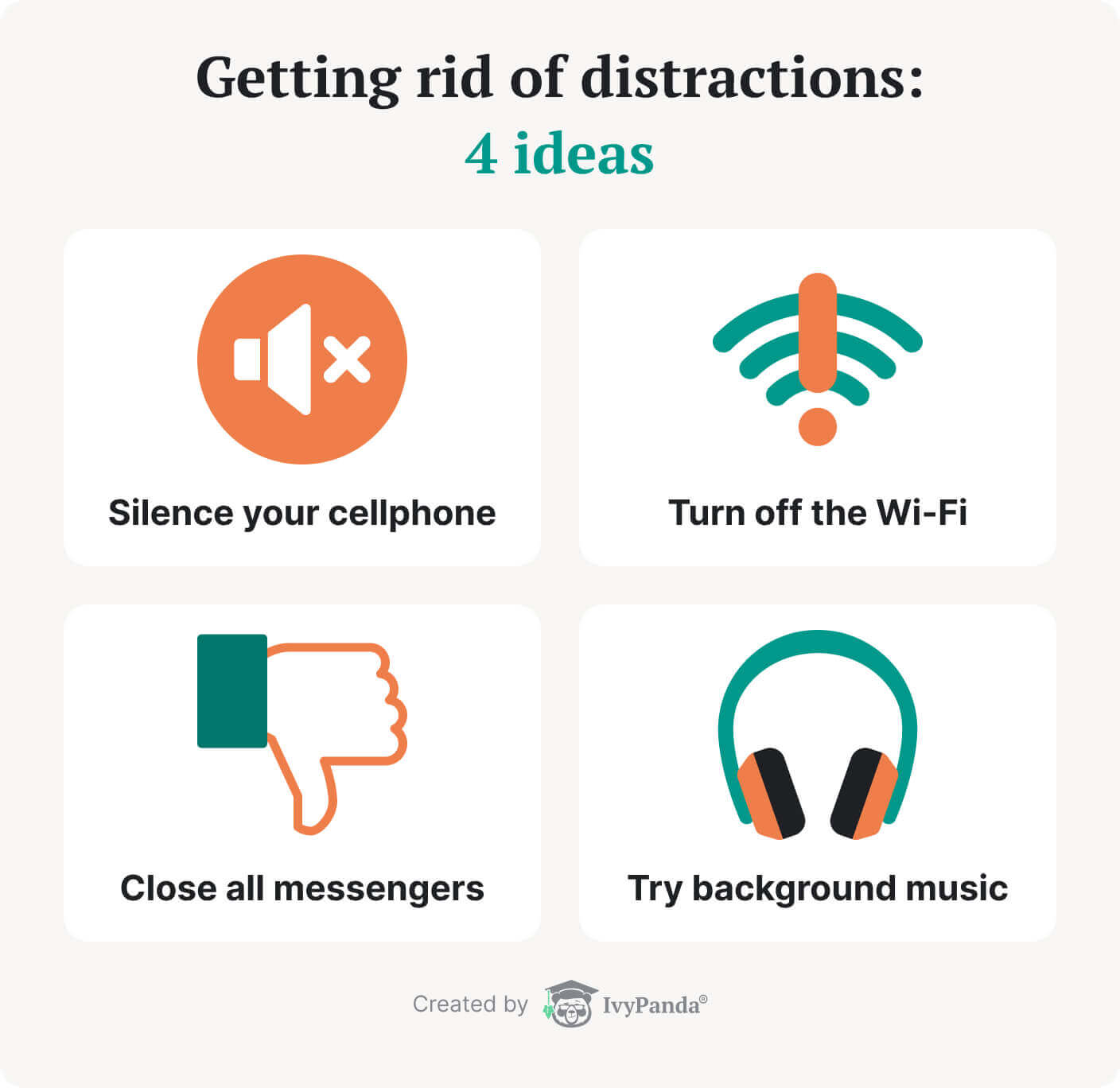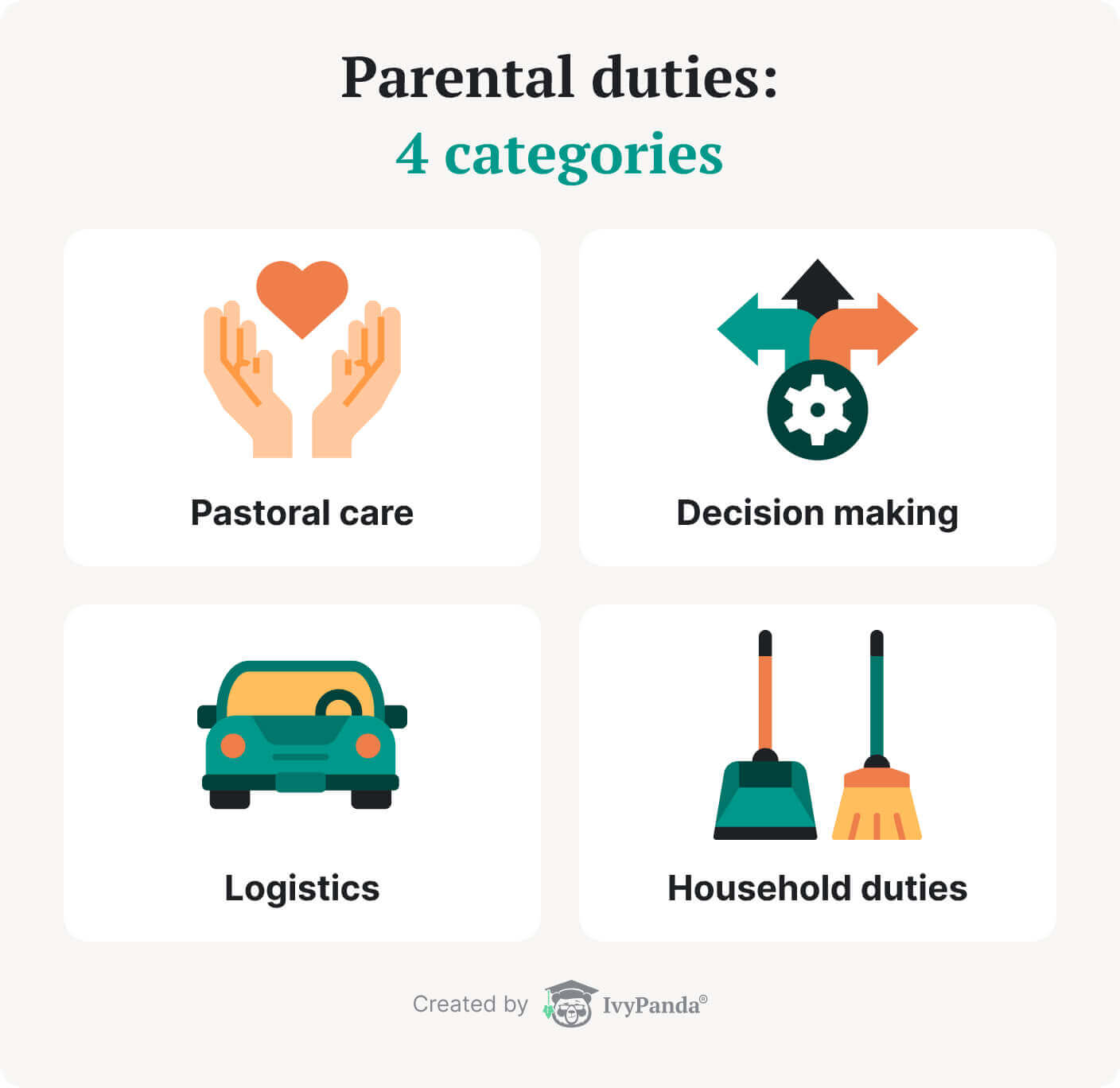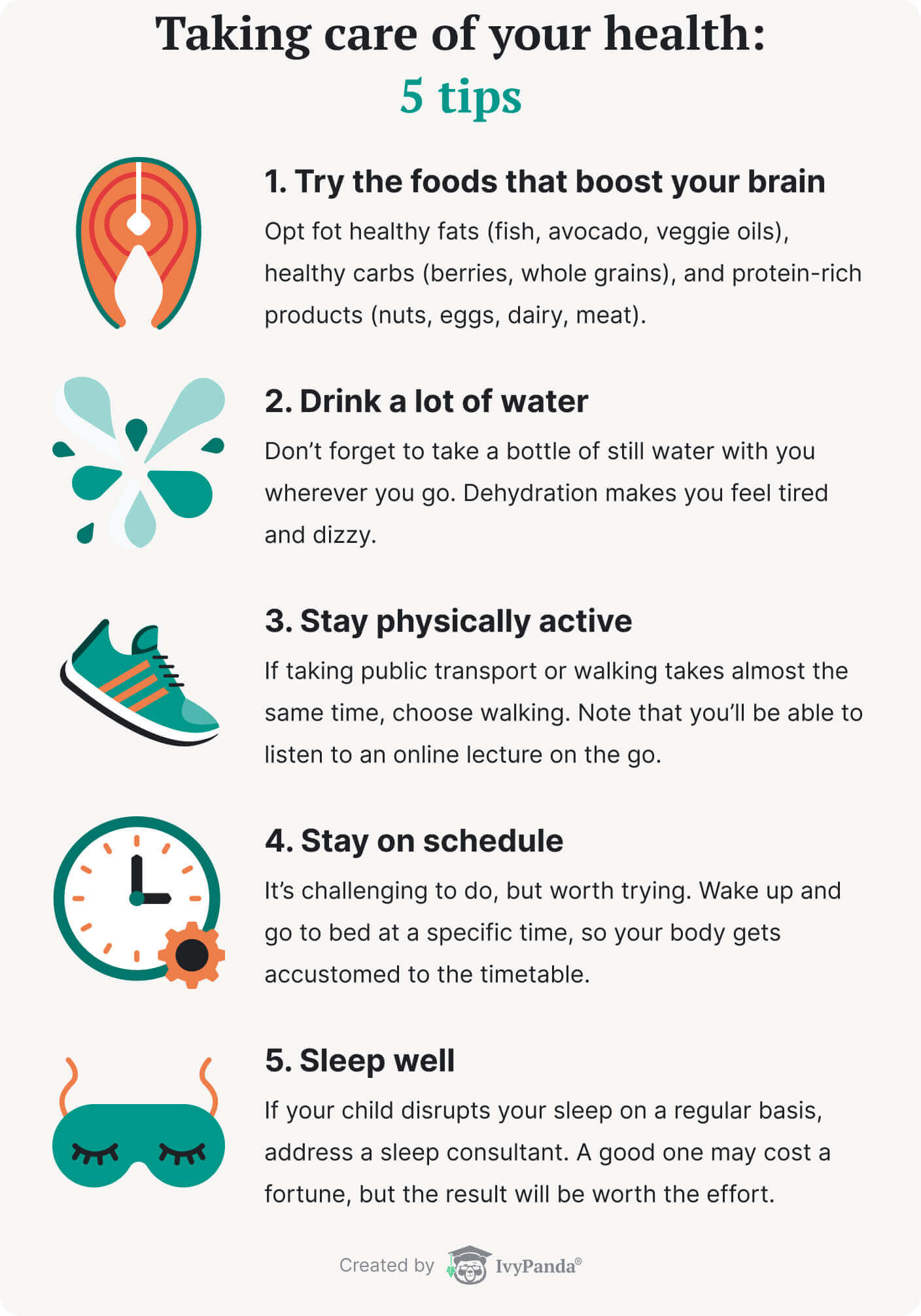Being a student mom is one of the most challenging roles to juggle. Unlike a regular job, which can sometimes be paused when life gets overwhelming, you can’t stop being a mom. So how to study with a baby for a college coursework or presentation? Sleepless nights, exams, dirty laundry, and other routine tasks all collide in the life of a mom and student, leaving little room for rest.
In this article, we provide 14 practical tips for succeeding as a student mom. Whether you’re managing the demands of being a student and a mom or seeking strategies to stay organized, this guide by IvyPanda experts will help you navigate the complexities of both roles. Crafted by two working mothers, these insights are rooted in real-life experience and designed to empower you on your journey.
✍️ Tip #1: Write Things Down
Let’s face it, motherhood and planning for more than one day in advance are hardly compatible. That’s why we decided to abstain from suggesting you make a time-sensitive to-do list. However helpful it may be for any other (non-mom) student, you’ll end up falling behind and scolding yourself for the failure. After all, planning and making lists should facilitate our lives and not add more hassle.
Writing things down is intended to unload temporarily irrelevant or non-urgent things from your head so you can return to them later.
That’s why it is a good idea to write down everything in more than one planner:
- A paper calendar for educational tasks with deadlines and important details;
- A school calendar with the schedule of your classes for easier planning;
- A notebook for your child’s needs;
- A notebook for study-related issues;
- A journal for general notes (every day, write down the most important events and thoughts of the day so as not to lose track of them).
There’s no need to have a paper version of all the above. Check out the digital tools below to reduce the weight of your backpack/diaper bag.
🏹 Tip #2: Don’t Overdo Multitasking
There is a notion that women do better at multitasking. However, the findings that influenced that idea were highly inconsistent, and contemporary research does not confirm the notion. In truth, all humans are equally bad at multitasking.
The inconsistency may have arisen due to the confusion between the two types of multitasking.
- Concurrent multitasking is simultaneously performing two or more activities (like texting while driving).
- Serial multitasking means making rapid switches between tasks (studying for an exam, checking your email and Facebook, and answering the phone). The latter is more frequent and detrimental. In brief, all multitasked activities take longer and bring worse results than if performed separately.

The advice “don’t overdo multitasking” while being a student and a mom sounds laughable. But we are talking about specific activities. Here’s a brief list of dos and don’ts while studying:
- Silence your cellphone and put it in an inconveniently distant place.
- Turn off the Wi-Fi connection on your computer if you don’t need it.
- If you need a Wi-Fi connection, close all messengers.
- When you have to study while your child is playing, try listening to background music through earphones. It is a research-proven fact that binaural beats do not just silence distractions but also benefit your concentration.
⏰ Tip #3: Use Your Time Wisely
Being a mom and a full-time student means that you spend half of the day studying and the other half caring for your child. This simple math leaves no room for any “me-time” or even 8 hours of sleep. The only solution is to use the available 24 hours as productively as possible.
- The easiest way to boost your productivity is to use a Pomodoro timer.
This technique divides your studying time into 25-minute sections with 5-minute breaks; it’s as simple as that. The tool has a psychological effect: you know that once you’ve completed the cycles, you can do whatever you want. And besides, small challenges always seem more manageable than a 4-hour marathon. - Time blocking is slightly more complicated but even more efficient for a student mom.
The idea is to avoid jumping between various activities and focus on one thing at a time. Your task is to divide your timetable into dedicated blocks and do what you are supposed to do during these periods. Cal Newport wrote his book Deep Work about this technique (although the book has other valuable advice too).
In the event of an emergency, you can painlessly cancel a block or two or change their order. So, if you fail to follow the schedule (which will happen a lot), at least you’ll have a chance to track the most significant time drainers.
😍 Tip #4: Embrace the Chaos
Do you have a child? Congratulations, you are an expert in chaos. Uncertainty is an intrinsic part of human life, but now you feel it more painfully than ever. Still, motherhood has its advantages: you become aware of the chaos.
In the first few years of your child’s life, you learn that total control is an unattainable illusion. All you have to do is relax and try to enjoy the spontaneity.
Here’s why:
- The future is unpredictable.
- Chaos makes you stronger.
- You learn to adapt and become resilient.
- It forces you to distinguish between the unimportant and essential.
- The big picture comes into view over time.
- Going with the flow is exciting.
If the chaos stresses you out in an unhealthy way, try mindful breathing. Focus on your inhalation and exhalation. Empty your mind of any thoughts. If some worries or memories come up, push them away. Regular practice will make you feel more stable in complicated situations.
🎯 Tip #5: Set Your Priorities
The Pareto principle claims that 80% of a result comes from just 20% of the actions. Knowing which activities are the most efficient and focusing on them is often beneficial. Of course, we cannot decide this part for you: you know yourself much better than we ever will! But parental priorities are comparatively similar for all people.

HBR believes that all parental duties fall under these four categories:
- Pastoral care (showing love, setting boundaries, teaching values, etc.);
- Decision making (making critical choices on education, healthcare, presents, etc.);
- Logistics (taking children to school and social events, etc.);
- Household duties (cooking, cleaning the house, laundry., etc.).
This is a wonderful example of the Pareto principle in action. Pastoral care is the primary function of a caregiver, and nobody can replace them in it. And it is also the least time-consuming category. Logistical details take up much more time.
Household duties are the least critical category, and anyone can handle them. But they eat up the most significant part of a parent’s day. The only way out is to automate or delegate your housework, and the following two tips will cover these solutions.
🤖 Tip #6: Automate Household Chores
Researchers predict that robots will do 90% of all household chores by 2040. That’s a dream life for a busy mom!
Unfortunately, we are not in 2040 yet, but many valuable appliances have already appeared. Roomba vacuums and mops, robot lawnmowers, dishwashers, multi-functional pots, and window cleaning robots are only some to mention. Some of them (for instance, smart dog and cat bowls) don’t save much time. Their purpose is to declutter your head from as many duties as possible.
🤝 Tip #7: Delegate Things
Ordering grocery delivery online is fairly automatable. Once you form a weekly list of food supplies, you can re-order them with several mouse clicks. To delegate cooking altogether, arrange pizza evenings from time to time. Besides, healthy ready-made food is also available (although it might be more expensive than cooking yourself).
In a word, if something can be delegated, do it! Babysitters and domestic maids are an excellent way to help your child have a well-rested and healthy mom. If not, friends, family, and your partner are often eager to help but don’t know how to do so.
The only concern here may be that they will have their own ways of doing things. For instance, you sing a song to your children to help them fall asleep, while your partner prefers reading a book. Let them develop different habits and don’t try to micromanage: it is highly discouraging to those who want to help you.
And don’t underestimate your kids: they can make their beds and put away their toys starting in the early years. You’ll have to dedicate some time to training them, but once you are successful, one big problem will be eliminated. And there’s a bonus: each new skill makes your children more independent.
🗃 Tip #8: Organize Your Study Space
A student mom will study at home most of the time, especially in the era of distance learning. The minimum study-at-home kit is a tidy corner, table, laptop, and a “don’t disturb” sign. For more complex organizational solutions for organizing your study space, consult this infographic. But in brief, here’s a set of general recommendations:
🏫 Tip #9: Make the Most of Your On-Campus Time
If you rarely skip classes because of parenting, you can consider yourself one of the lucky ones. Many student mothers point out that they feel much more focused and upbeat while on campus. And no surprise – nobody is there calling you ‘mom’ every five minutes.
Take advantage of this opportunity. Leave all your parental concerns off campus:
- Participate in discussions,
- Ask questions,
- Immerse yourself in the available knowledge.
You will also benefit from using breaks between classes to cope with homework. It will take you less time and effort than while you are at home with a baby. Besides, completing all the assignments on campus allows you to turn distracted babysitting into quality time back home.
✅ Tip #10: Be Practical & Realistic about Elective Subjects
Despite the unquestionable benefits of being on campus, be aware that you’ll waste some time getting there and back every day. There are a few rules that can make your schedule more practical:
- Do enough research in terms of elective subjects. How much coursework and reading will they require? Are they critical for your future specialization and career? The advice here is that quality is better than quantity. If you can select fewer or less time-consuming subjects, do so.
- Stack as many classes as possible into several days to have more days off.
- Schedule your classes at the same time as your child’s daycare so you don’t split yourself between home and classes.
🏃 Tip #11: Think of Your Health
Motherhood plus education is not 1+1. It is 22. By the end of the semester, you will be exhausted. But the energy you dedicate to studying is just the tip of the iceberg. Like anyone, you will fall sick from time to time, and it can feel like a low blow. Most colds are unpredictable, but it is always a good idea to take care of your health.

- Adjust your diet to your brain’s needs. Opt for healthy fats (fatty fish, avocado, and veggie oils) and protein-rich products (nuts, eggs, dairy, and meat). Don’t forget about healthy carbs that can be found in fruit, berries, and whole grains.
- Carry a bottle of still water wherever you go. Dehydration makes you feel tired and dizzy.
- Stay physically active. For instance, if taking public transport or walking takes almost the same time, choose the latter. Besides, you’ll be able to listen to an online lecture on the go.
- Try to stay on schedule, though this is challenging. Wake up and go to bed at a specific time, so your body gets accustomed to the timetable.
- Address a sleep consultant if your child disrupts your sleep on a regular basis. A good one may cost a fortune, but the result will be worth the effort.
🛀 Tip #12: Find Time for Yourself
Some moms experience guilt if they leave their child with a babysitter while studying or working. They use every free minute to do homework or housework to make up for this feeling. But this approach won’t bring you more freedom. There’ll always be chores and assignments to do. And another hour of sleep does not count as “me-time.”
Arrange cozy evenings with your partner while another family member babysits your kid. Read books outside the curriculum while your child is quietly playing (happily, such moments do also happen). We cannot say for sure about becoming “dull,” but all work and no play makes you sick, nervous, and unmotivated.
Kids need a happy mom. If you cannot afford to relax for the sake of your health, do so for the sake of your children.
❌ Tip #13: Learn to Say No
If you are one of the people who struggle with saying “no,” being a full-time mom and student will make you reconsider your priorities. You cannot be everywhere at the same time.
Partying with college friends, going out with your partner, reading to your kid, and cooking meals for house guests are incompatible activities. They can be equally pleasurable, but all have an identical drawback: you can only do them in succession. Thus, make wise choices and say “no” to the things you can skip.
Be ready to confront persuasive techniques:
The good news is that there’s always a way to say a polite “no.” For example:
🌷 Tip #14: Be Kind to Yourself
Trying to excel in everything will bring you to ruins. Burnout and depression are much more than catchwords in life coaching videos on YouTube. What would you like to achieve in your studies? If getting a degree is not as important as being a full-time mom, reconsider your reasons for studying. And yes, this type of critical analysis takes immense amounts of discipline and honesty.
Having a purpose brings happiness. You feel more accomplished, successful, and motivated when you achieve your goal.
But remember, if something doesn’t work out and you fail a class, it is not the end of the world. Even the best students have their worst days. Retake the course later, i.e., focus on the solution, not the problem.
We hope our advice will bring you a more fulfilled life, and your kids will see you as a role model of persistence and self-discipline. Below you’ll find an infographic that contains all the tips described in this article. Enjoy!

Remember: if you are worried about being a good parent and student, know that you are already a good one. Bad ones don’t even consider that they could be better. Have any tips to share with other student moms reading this article? You are welcome to do so in the comments below.
🔗 References
- The student mom: How to maximize study time – SheKnows
- How To Combine Motherhood With Studies at the Institute?
- 13 science-backed tips to stay focused and avoid distractions
- 5 Best Daily Planner Apps To Boost Your Productivity – Lifehack
- How to Delegate: 14 Steps (with Pictures) – wikiHow
- Studying 101: Study Smarter Not Harder – UNC Learning Center
- How do working moms find time for themselves? – Quora
- The Professional Women Who Are Leaning Out – The Atlantic

![Traveling as a Student [Guide + Infographic]](https://ivypanda.com/blog/wp-content/uploads/2021/10/traveler-asian-woman-spending-holiday-trip-ayutthaya-thailand-309x208.jpg)
![220 Mental Health Resources for Students [Free & Affordable]](https://ivypanda.com/blog/wp-content/uploads/2021/08/couple-meditating-practicing-yoga-home-sofa-focus-hands-309x208.jpg)
